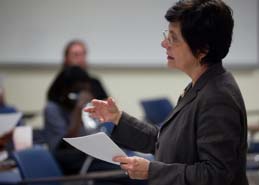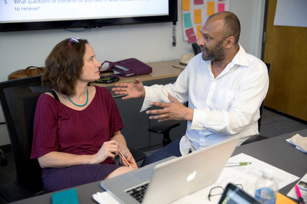Purpose

- Provide recommendations to the faculty senate on the maintenance of instructional quality
- Provide systematic review of Instructional Quality Evaluation, and teaching excellence in an environment of rapid growth
- Serve as advisory committee for the Teaching Resource Center; guide on the allocation of available funds and encourage supportive activities
- Advise on faculty development opportunities for lecturers
Subcommittee Members
- Jo Anna Grant, Subcommittee Chair, Teaching Resource Center Ex-officio
- Lisa Bartle, Library 2017-2019
- Iris Riggs, Education 2017-2019
- David Maynard, Natural Sciences 2017-2019
- Kimberly Collins, Business & Public Administration 2016-2018
- Kareen Gervasi, Arts & Letters 2016-2018
- Rafik Mohamed, Social & Behavioral Sciences
- Craig Seal, Undergraduate Studies Rep Ex-officio
- Clare Weber, Associate Provost Ex-officio
- Vacant, Graduate Studies Rep Ex-officio
Progress
Efforts to spread innovative pedagogy have been concentrated in three areas that research has shown to be effective in improving student performance:
-
Project Based Learning: This is a student-centered approach in which students gain knowledge and skills by working for an extended period on an authentic, engaging and complex problem, question or challenge. Benefits to students have been shown in areas such as increased motivation to learn, deeper learning, and increased problem-solving skills. PBL has been shown to be more effective than traditional teaching methods particularly in math, economics, language, and sciences, to mention a few.
We sponsored a three-day PBL Institute with 17 faculty in December 2017. Their classroom projects are just now being completed and their ePortfolios uploaded to our website for dissemination to other faculty.
-
Adaptive Learning: Adaptive Learning is a computer-based pedagogical approach that adapts the learning materials and lesson pacing to the needs of individual learners. AL allows students to quickly move ahead in content areas they know well, while providing extra support and learning materials when they need it. Thus, each learner may take a different path through the class to reach the same course learning objectives. It can be used effectively in online, flipped, and hybrid format classes—and it has been shown to increase student performance up to 15%.
Janine Kremling, assistant professor in criminal justice, is taking the lead on this effort. She has researched software platforms, piloted AL in her classes, and led a workshop to show nine faculty how to use the SmartSparrow platform to incorporate AL into their classes.
-
 Reacting to the Past: Reacting to the Past is an engaging and proven high-impact pedagogy that can be used in a wide range of courses and disciplines, and in both small and large class formats. In RTTP courses students learn by taking on roles, informed by classic texts, in elaborate games set in the past at moments of extreme conflict and debate. They learn skills—speaking, writing, critical thinking, problem solving, leadership, and teamwork—in order to prevail in difficult and complicated situations.
Reacting to the Past: Reacting to the Past is an engaging and proven high-impact pedagogy that can be used in a wide range of courses and disciplines, and in both small and large class formats. In RTTP courses students learn by taking on roles, informed by classic texts, in elaborate games set in the past at moments of extreme conflict and debate. They learn skills—speaking, writing, critical thinking, problem solving, leadership, and teamwork—in order to prevail in difficult and complicated situations.We are sending up to nine faculty to attend the RTTP three-day Institute at Barnard College in June 2018 to learn and spread this high-impact pedagogy across disciplines and across our campus. In addition, we have become an institutional member of the Reacting Consortium, and hope to host a RTTP Institute on campus next year to expand faculty exposure to this exciting pedagogy—especially for our lecturers and graduate teachers.
Professor Terri Nelson is one of our campus innovators that has used this method three times. She says, “The results have been amazing. Where the DFWI rate usually is 18 to 25 percent in the Hum 330 and Hum 340 classes, I've had a DFWI rate around 4 to 6 percent. And it's not been an easy A. Students have to write several papers, give speeches and engage actively in class activities... and they do! They even show up before class starts!”
For additional updates, see Steering Committee Meeting Minutes.
Contact Us
Progressive Pedagogy Subcommittee Chair
Jo Anna Grant
jgrant@csusb.edu